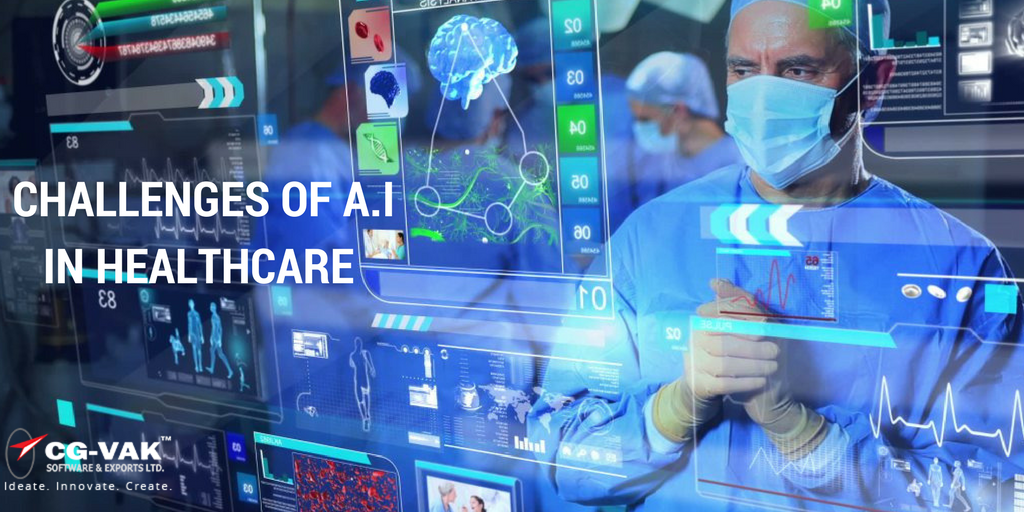We keep witnessing the incredible potential of Artificial Intelligence in redesigning Healthcare. The capacity of A.I in scheduling treatments, assisting repetitive tasks like prioritizing emails in the doctors’ inbox, finding relevant medicine related documents in seconds and assisting in complex surgeries are some of the familiar areas where A.I applications thrive.
However, the way we understand the capacity of artificial intelligence applicable to everyday life is still questionable. After getting a clear insight of the capabilities of A.I in Healthcare, it is crucial for us to get a thorough understanding of the top challenges in implementing A.I in Healthcare.
Top 6 challenges in Implementing A.I in Healthcare:
- Technological Challenges
- Medical Challenges
- Ethical Challenges
- Regulatory Challenges
- Misconceptions & Overhyping
- Human Rejections
Technological Challenges
The Artificial Intelligence that we are witnessing today is the Artificial Narrow Intelligence (ANI), the first stage of A.I. These are narrowly intelligent programs built to perform tasks better than humans. But each one is unique. For instance, IBM’s supercomputer Deep Blue winning at chess is a great example. The downside of such algorithms is that they are not capable of performing other tasks like driving cars or creating art. Each task requires a different narrow program, physically built to perform that particular task.
Narrow programs can currently recognize topics from texts or derive the meaning of documents. We still have a long way before we move closer to Artificial General Intelligence (ANI) where a machine is capable of documenting concepts from limited experience and exchanging knowledge across domains.
Medical Challenges
Processes such as image recognition, machine learning, and deep learning algorithms in Radiology carry the risk of feeding the computer with thousands of images along with the underlying bias. For instance, images originate from a particular area and the framework that is used to conceptualize that particular algorithm requires several subjective assumptions. The predicting abilities of a smart algorithm are connected to the previous cases and it won’t be helpful in treating new cases of drug side effects or treatment resistance.
Administrative tasks such as streamlining medical records are another big challenge. Computers are clueless in analyzing the notes scribbled by doctors which they themselves cannot recognize it weeks later.
Ethical Challenges
Like the medical and technological challenges of A.I, there are still some ethical challenges that must be overcome. The regulations deciding on the safety must be measured out in case A.I fails to make an accurate prediction.
Complex ethical and legal issues should be sorted out before implementing A.I in order to allow time and space for mapping the potential risks and downsides. Independent biomedical research groups must monitor the process closely.
Regulatory challenges
Acknowledging and approving A.I Technologies tend to be slow. The momentum at which A.I technologies evolve is very high and it is in the hands of decision-makers to guide the process of implementing A.I in Healthcare. They must make it possible to put affordable solutions on the table and help in setting up standards on usage.
Misconceptions and Overhyping
Overhyping A.I capabilities through exaggerated media promotions seem to do nothing but destroy the image of A.I in Healthcare. Such misconceptions hinder the implementation of A.I in healthcare systems. Precise definitions of machine learning, deep learning, smart algorithms, AGI and any similar concept related to A.I must be communicated properly.
Human Rejection
The fears around A.I are definitely hindering its implementation. The misinterpreted message that A.I could take over our jobs is simply not true. Without a clear view of the complete potential of A.I and the capacity of humans to take control and program A.I exactly the way it is supposed to function, A.I applications seem to be rejected across various domains including healthcare.
‘Humans and Machines’ is always a winning combination, even in Healthcare. All that needs to be done is to project A.I accurately and address individual challenges professionally in order to implement A.I for the best version of modern healthcare.
